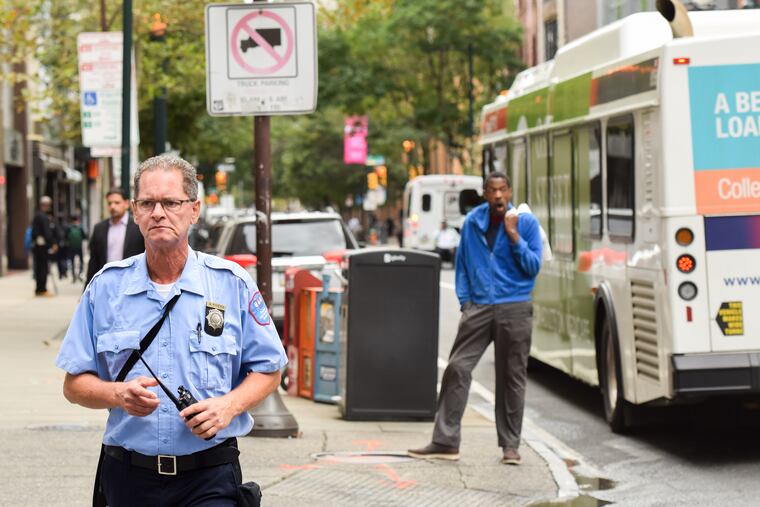Traffic enforcement made SEPTA bus service faster, but can the city sustain it?
A small improvement in bus speeds is a hint to how Philadelphia can improve public transit.

Buses that serve tens of thousands of riders a day in Philadelphia ran faster thanks to a four-month traffic enforcement surge that began last fall.
The gains were not substantial, but they demonstrate that penalizing bad habits such as stopping in a bus zone or double parking does improve bus performance, city officials said Thursday.
“It’s a test of our ability,” Mike Carroll, deputy managing director for the city’s transportation office and a SEPTA board member, said after the transit agency’s monthly board meeting. “We know the scope of improvement that’s possible.”
Improving bus service is of keen interest to city officials and SEPTA. The transit agency has reported declining bus ridership four years straight, and in 2018 had 155 million bus trips, the lowest count in at least 17 years, according to recently released federal data. Buses are chronically late and in some parts of Philadelphia, are slower than a person on foot. This spring, SEPTA anticipates soliciting proposals to reimagine bus service, but the work will likely take two to three years.
Philadelphia transportation planners want a reinvented bus service as a cornerstone of their plans for city transit. More bus riders means fewer cars, less congestion and pollution, and better access to jobs, city officials have said. Discouraging delivery trucks and vehicles from blocking lanes is one way to make bus service more efficient.
“A bus needs space,” said Scott Sauer, SEPTA’s assistant general manager of operations. “The less space there is to maneuver around cars, the slower it is.”
From Sept. 24, 2018, to Jan. 28, 2019, officials measured the effects of a beefed up presence of Philadelphia and SEPTA police officers, along with Philadelphia Parking Authority agents, on Chestnut Street between 11th and 21st Streets, and on Market Street between Seventh Street and City Hall. The officers focused on midday, when buses were most affected, and collectively issued about 3,635 tickets. Buses on Chestnut Street ran an average of 2½ minutes faster and, on Market Street, half a minute faster, the city reported, compared to the three weeks before the enforcement surge.
Overall, traffic on those streets moved slightly slower during the four-month enforcement surge, but travel times improved, likely as a result of fewer vehicles double parking, officials said.
Fourteen SEPTA bus routes, which collectively move about 76,000 riders each work day, use either Chestnut or Market Streets in the area where enforcement focused. The PPA estimated that the tickets issued, if all were paid, would bring in about $264,000.
SEPTA and city officials acknowledged that a limit on manpower would make it difficult to expand the enforcement effort and that effort was not enough on its own to dramatically improve bus service.
“I wouldn’t say we’re going to hang our hats on two minutes,” Carroll said.
One solution could come in the form of a new class of traffic enforcement officers Philadelphians will consider creating via a ballot question May 21. Automated enforcement is also a possibility. The city uses red light cameras and recently approved the use of speed cameras on Roosevelt Boulevard.
Enforcement should be complemented by other changes, including differently timed lights, adjusted schedules, and new engineering for city streets, Carroll said.
At the SEPTA meeting Thursday, the board approved a five-year contract with 178 SEPTA transit police officers who went on strike for a week earlier this month. The contract included wage increases through 2023 and addressed a body camera policy that union leaders said was a sticking point in negotiations. SEPTA had not allowed officers to view body camera footage before providing an account of events. That policy changed to allow officers to view footage after filing a report and then submit an amended report. Officers may also view the video before an interview in an administrative or internal affairs investigation.
Also at the meeting representatives from the state legislature, governor’s office, and city administration paid a tribute to SEPTA’s chairman, Pasquale “Pat” Deon, who in February was reappointed as head of the transit agency for a 20th year. Deon, a Bucks County Republican, is likely to be a key player in efforts to find new sources of state funding for transportation in Pennsylvania.